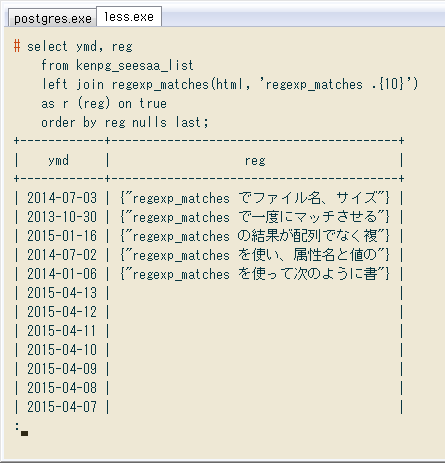
The REGEXP_MATCHES () function accepts three arguments: 1) source. The source is a string that you want to extract substrings which match a regular expression. The pattern is a POSIX regular expression for matching. The flags argument is one or more characters that control the behavior of the function. Examples Let’s see some examples to understand how the REGEXP_REPLACE() function works.
If there is no match to the pattern , the function returns no rows. Postgres regex substring or. Return all captured substrings resulting from matching a POSIX regular expression against the string. The ones we commonly use are ~, regexp _replace, and regexp _ matches.
The g flag is the greedy flag that returns, replaces all occurrences of the pattern. Henry Spencer for Tcl 8. The following query attempts to find the first number in a string. This question is probably less about regex and more about set algebra. My hunch is that there is an elegant way to do it,. To solve for rownum, use a CTE (WITH clause) to add a rownum-like column to your underlying table.
The tilde operator works fine. If you omit the flags parameter, the regex is applied case sensitively, and only the first match is replaced. SIMILAR TO or regular expressions with basic left-anchored expressions can use this index, too. Trigram matches or text search use special GIN or GiST indexes.
I’m running the query below, and it is limiting as if “ regexp_matches ” being in where clause. IMHO, it is wrong: in case there is no match, shall return null or empty array – not remove the result from the set! Is this a collateral effect of using regexp_matches in columns? It’s a synonym for REGEXP_LIKE().

If the string matches the regular expression provide the result is otherwise it’s 0. It is not listed in their help , however I see examples in the web which utilize it. I have a UTF-database, where collation and c_typ e are en_US. The POSITION() function requires two arguments: The substring argument is the string that you want to locate. The string argument is the string for which the substring is searched. Your mail client copies the replied-to message ID into the References: header, and well-implemented mail clients will thread your message under a now-unrelated thread.
Definition at line of file regexp. If either expr or pat is NULL, the result is NULL. REGEXP _ MATCHES is not case sensitive, except when used with binary strings. I wrote: FWIW, I have a vague idea of what these do: They match greedily, i. Use this function in the FROM clause of a SELECT ARRAY_TO_STRING() statement and limit the number of rows returned by this statement to using LIMIT.
You can use the tilde operator ~ to filter columns using a regular expression. The substring function extracts the part of a column that matches a regex, while the regexp _replace function replaces that part with another string. Together, these three allow you to create some very powerful SQL queries with very little code. A common function in many high-level languages is split, which takes a string and returns an array of items.
A regular expression is a set of characters in a specific sequence that helps identify the required correct input. We are going to take a look at regex and how to use them using different approaches or operators such as LIKE, NOT LIKE, and SIMILAR TO in addition to the tilde operator family such as ~, ~, ! Your regexp_matches() expression just returns an array of all captured substrings of the first match. As you only capture one substring (one pair of brackets in your pattern), you will exclusively get arrays with one element. So you need a sub-select to test them all (or aggregate). This Oracle tutorial explains how to use the Oracle REGEXP _LIKE condition (to perform regular expression matching) with syntax and examples.

Not to be confused with the LIKE condition which performs simple pattern matching. Deprecated: Function create_function() is.
Geen opmerkingen:
Een reactie posten
Opmerking: Alleen leden van deze blog kunnen een reactie posten.